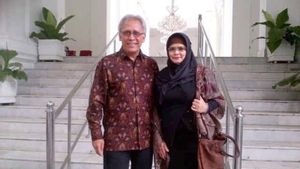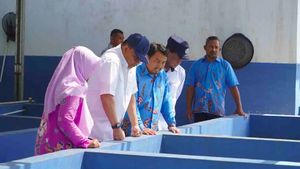JAKARTA Bullying is still a serious problem in Indonesia. Bullying cases are currently in the public spotlight again and cases are increasing. Based on data from the Indonesian Child Protection Commission (KPAI), there have been at least more than 226 cases of physical and psychological violence, including bullying.
Then KPAI also noted that during the 2016-2020 period there were 665 children who had to face the law because they were perpetrators of violence. In detail, 506 children commit physical violence and 149 children commit psychological violence.
According to data from the Program for International Student's Assessment (PISA) in 2018, 41.1 percent of students in Indonesia claimed to have experienced bullying. In the same year, Indonesia took the fifth highest position out of 78 countries as the country with the most cases of bullying in the school environment.
The National Survey of Child and Youth Life Experience (SNPHAR) by the Ministry of Women's Empowerment and Child Protection (KPPPA) in 2018 stated that every 2 out of 3 teenagers had experienced violence, and every 3 of the 4 cases were cases between their peers.
If left unchecked, bullying can have a prolonged impact on victims such as stress, depression, and even trauma. In addition, bullying victims can also experience health problems and a decline in academic performance. Bullying problems at school need to be overcome with cooperation from teachers at school and students' families. One thing that can be done by educators to deal with the impact of bullying is to provide appropriate counseling to victims of bullying at school.
Realizing the dangers of bullying to students, the Satkaara Sharing Teacher Community (KGSB) held a KGSB Webinar entitled 'Conseling Technicals to Victims of Bullying in Schools' on Saturday, April 15, 2023, which was attended by hundreds of teaching staff from KGSB members from Indonesia and Timor Leste.
This webinar presents speakers, namely Secretary of the S1 Study Program of the UNIKA Atma Jaya Faculty of Psychology, Nanda Rossalia, M.Psi, Psychologist, Founder of BK Teacher's House and Widyaiswara of the West Java Province Mobilizing Teacher Center at the Indonesian Ministry of Education and Culture, Ana Susanti, M.Pd,CEP, CHt, as well as BK SMPN 2 Jayapura Teacher and KGSB Member, Manggar Istanti., S.Pd., M.Pd.
KGSB founder, Ruth Andriani, said that recently the rise of news on bullying cases has become increasingly concerning, especially bullying through physical violence in the school environment. Whereas the school environment should be a place to study that is safe and fun for all.
If we look at the impact, of course there will be psychological impacts experienced by victims of bullying so that the role of educators is very important in helping and assisting victims of bullying through appropriate counseling techniques.
"Through this effort, we hope that we can not only 'treat', but in the future we can all jointly prevent and break the chain of bullying, especially in the school environment. As well as make School a safe and comfortable space for children to learn and develop themselves," said Ruth.
The founder of the BK Teacher's House, Ana Susanti, explained that collaboration from all related parties is needed to prevent and handle bullying cases in schools. According to data from Comparitech in 2018, 82.8% of bullying cases occurred in schools, making schools the location for the most cases of bullying.
VOIR éGALEMENT:
The Ministry of Education and Culture, Research and Technology of the Republic of Indonesia together with UNICEF Indonesia implemented the Roots program to prevent bullying in the educational environment. This program was developed since 2017 and was originally implemented in South Sulawesi, Central Java, and West Papua. Roots program focuses on overcoming bullying in schools by involving peers. This program is considered effective because it can reduce the level of bullying in schools by 30% when it was implemented in 2017. Roots program will begin to be implemented nationally in 2021, "explained Ana.
Secretary of the S1 Study Program of the UNIKA Atmajaya Faculty of Psychology, Nanda Rosalia, explained that to provide counseling to victims and witnesses and bullying perpetrators, it can be done with the ABC irrational belief technique. This technique recognizes negative thoughts or irrational belief from victims, witnesses, or perpetrators and then turns them into a rational belief that can change the way to deal with negative events that occur.
"To help victims of bullying, a counselor must provide appropriate and necessary counseling by the victim by recognizing what negative thoughts the victim has so that the bad effects of bullying can be avoided," concluded Nanda.
The English, Chinese, Japanese, Arabic, and French versions are automatically generated by the AI. So there may still be inaccuracies in translating, please always see Indonesian as our main language. (system supported by DigitalSiber.id)













